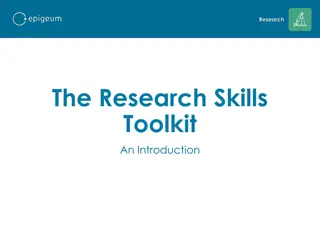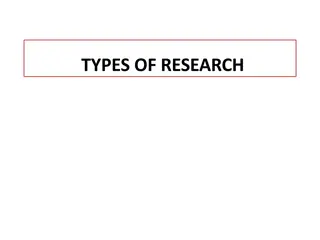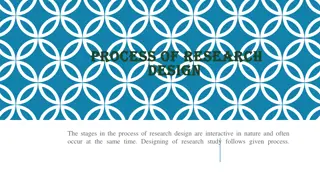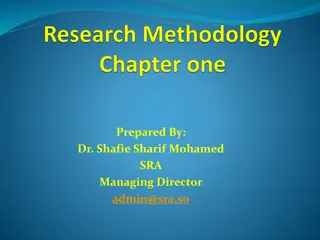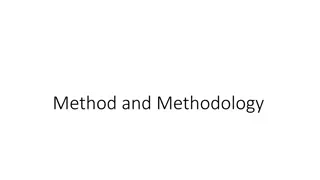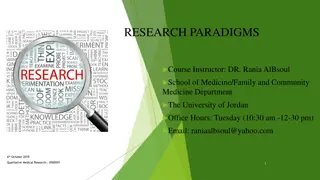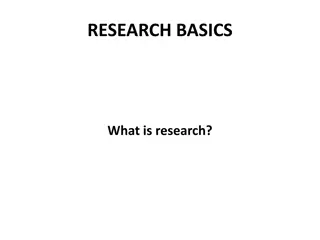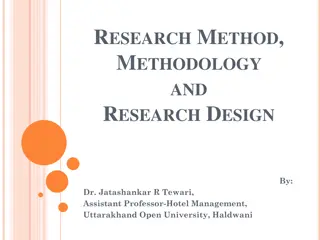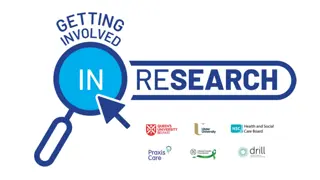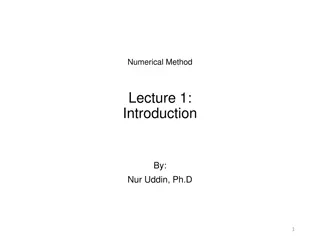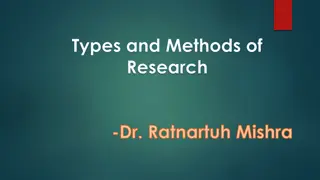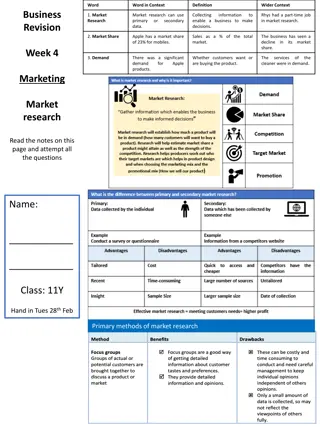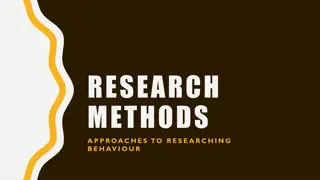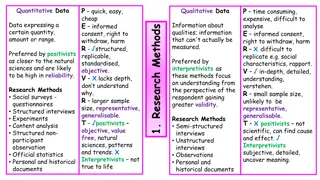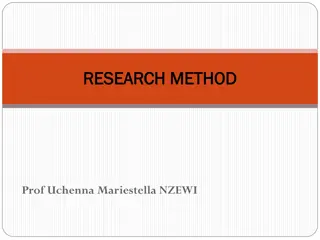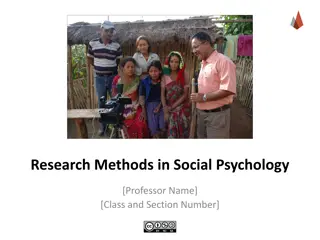Extension Teaching Methods
Extension teaching methods play a crucial role in facilitating communication and knowledge transfer between rural communities and extension workers. These methods aim to engage, stimulate, and guide learners through the process of acquiring new skills and knowledge. Centurion University in India emp
4 views • 8 slides
UCC Research Support and Strategies Overview
UCC's Research Support, Policy & Strategy function, led by David O'Connell, PhD, provides comprehensive support for research activities at the university. The office manages research funding, monitors performance, and facilitates engagement with external stakeholders. UCC's involvement in Horizon Eu
3 views • 17 slides
Understanding Quantitative and Qualitative Research Methods
Exploring the differences between quantitative and qualitative research methods, this content delves into the importance of qualitative research, various methodologies such as focus groups and interviews, data collection, research ethics, and analysis techniques. It also covers the elements of the r
4 views • 43 slides
Overview of Semi-Empirical Methods Based on Hartree-Fock
Semi-empirical methods derived from Hartree-Fock theory aim to reduce computational effort by approximating or eliminating electron repulsion integrals. Strategies include introducing adjustable parameters to replace ERI calculations and utilizing zero differential overlap methods like CNDO, INDO, N
1 views • 11 slides
Enhancing Research Skills with Epigeum's Research Skills Toolkit
Epigeum, a leading provider of online courseware, offers the Research Skills Toolkit, comprising five core programs designed to equip postgraduate researchers with key skills and knowledge. Developed from the Research Skills Master Programme, the Toolkit integrates interactive learning design, user-
1 views • 9 slides
Understanding Different Types of Research Methods
Explore the various types of research methods including Applied Research, Basic (Fundamental or Pure) Research, Correlation Research, and Descriptive Research. Learn about their purposes, advantages, and disadvantages in conducting scientific investigations.
1 views • 26 slides
Effective Proposal Writing for Health Research
Learn about the fundamentals of research proposals for health-related studies, including defining research, understanding the purposes of health research, and exploring motivation for undertaking research. Discover the difference between basic and applied research, examine types of research, and del
1 views • 70 slides
Overview of Research Problem Identification and Formulation
Understanding the importance of defining a research problem, this content delves into the selection and formulation of research problems, the definition of a research problem, reasons for defining it, methods for identifying research problems, sources of research problems, and considerations in sele
1 views • 11 slides
Understanding the Process and Types of Research Design
The process of research design involves interactive stages occurring simultaneously, leading to the creation of a structured study. There are three main types of research design: exploratory, descriptive, and experimental (or causal). Each type has its own objectives and methods. Exploratory researc
0 views • 7 slides
Understanding Research Aims, Objectives, and Hypothesis in Health Research
This content delves into the importance of defining research aims, objectives, and hypotheses in health research. It explains how research aims clarify the study's goals, objectives outline specific tasks to achieve those goals, and hypotheses help in making predictions. It also discusses the proces
1 views • 17 slides
Understanding the Essence of Research: A Comprehensive Overview
Research is a systematic pursuit of new knowledge, aiming to unveil hidden truths through data collection and analysis. This course outline delves into the fundamentals of research, covering topics such as types of research studies, importance of research, and distinctions between pure and applied r
3 views • 32 slides
Understanding Research Methods and Participants
Explore the differences between method and methodology, types of research methods and methodologies, characteristics of participants in studies, and inclusion/exclusion criteria. The content elaborates on the importance of rationale, justification, and techniques/tools used in research, along with e
0 views • 17 slides
Epic Tools for Clinical Research by Shara Power, RN, BSN, OCN
Explore Epic tools for clinical research developed by Shara Power, a skilled application developer specializing in EPIC Beacon Oncology at UIHC Healthcare Information Systems. Learn about managing research study records, investigational study medication orders, and the process for creating and using
0 views • 26 slides
Understanding Research Paradigms in Qualitative Medical Research
Delve into the world of research paradigms in qualitative medical research with a focus on the key differences between objective and subjective research, the meaning of research paradigms, components of research paradigms, types of research paradigms, and how paradigms guide the selection of researc
0 views • 42 slides
Understanding Contraception: Methods, Importance, and Considerations
Contraception refers to methods used to prevent unwanted pregnancies, regulate pregnancy timing, and spacing between pregnancies. It is essential for women's reproductive health and can include barrier methods, hormonal methods, emergency contraception, and intrauterine devices. These methods are sa
3 views • 28 slides
Understanding Research: Basics, Purpose, and Methods
Research is a systematic process of inquiry, investigation, and discovery aimed at generating new knowledge, solving problems, and exploring existing situations. It involves utilizing various methods to collect and analyze information to draw meaningful conclusions. The purpose of research includes
0 views • 25 slides
Understanding Research Methods and Methodology in Hotel Management
Research in hotel management involves a structured process of inquiry to collect, analyze, and present information on various topics. The research process typically consists of steps like posing a question, collecting data, and presenting answers. Researchers follow a scientific method to identify p
0 views • 22 slides
Understanding Research Methods: Quantitative, Qualitative, and Mixed Approaches
This introduction provides an overview of qualitative, quantitative, and mixed methods research, highlighting key differences and various types of research approaches. It delves into exploratory, descriptive, and causal research methodologies, offering insights into problem discovery, data collectio
0 views • 50 slides
Guidelines for Selecting Research Project Topics in Environmental Health
Research is crucial for addressing environmental health issues. Choosing a good research topic is the first step towards effective research. This paper discusses the meaning, characteristics, types of research, and the research process to help in selecting appropriate research topics. Understanding
0 views • 15 slides
Comprehensive Research Training Programme in Social Sciences
Delve into the Research Training Programme offered by the Graduate School of Social Sciences, led by Professor Mark Tranmer. Explore the importance of research methods training, course offerings under the Research Training Programme (RTP), the Certificate in Social Science Research Methods (CSSRM),
6 views • 11 slides
The Importance of Research Methods in Building Knowledge and Answering Questions
Research methods play a pivotal role in shaping how we construct knowledge, address research inquiries, and determine the questions we can explore. Practices in research are evolving with open-science initiatives, data sharing, and innovative methods across interdisciplinary fields. Objectives have
0 views • 21 slides
Introduction to Numerical Methods: A Comprehensive Overview
Numerical methods play a crucial role in solving mathematical problems efficiently through arithmetic operations. This lecture by Dr. Nur Uddin covers the fundamental concepts of numerical methods, emphasizing their importance in engineering problem-solving with the use of modern digital computers.
1 views • 17 slides
Understanding Methods of Social Work
Methods of social work encompass various approaches aimed at enhancing social functioning and addressing problems in individuals and communities. These methods are categorized into primary and secondary methods, each serving different purposes in the field. Primary methods involve direct interaction
0 views • 20 slides
Understanding Types and Methods of Research for Effective Studies
Discover the qualities of good research, characteristics of scientific study, types of research, and classifications based on objectives and approach. Learn about quantitative and qualitative research methods, including surveys, case studies, and ethnographic research.
0 views • 27 slides
Understanding Moving Averages and Exponential Smoothing Methods
Forecasting methods like moving averages and exponential smoothing are essential for analyzing time series data. Averaging methods involve equally weighted observations, while exponential smoothing methods assign unequal weights that decay exponentially. Both methods can be useful for forecasting in
0 views • 18 slides
Explore SAGE Research Methods: Your Gateway to Extensive Resources
Discover the world of SAGE Research Methods platform, a comprehensive database with over 6,000 resources for all stages of research. From framing research questions to publication, access a wealth of content created and verified by experts, including books, articles, videos, and more. Enhance your r
0 views • 13 slides
Types of Birth Control Methods and Their Effectiveness
Explore the different types of birth control available, including abstinence, hormonal methods, barrier methods, and permanent methods. Learn about the effectiveness rates, how they work, and their pros and cons to make an informed decision about contraception. From hormonal options like pills, patc
0 views • 23 slides
Understanding Market Research for Business Success
Market research is crucial for businesses to gather information about their target market, customer needs, competition, and market trends. Primary and secondary research methods, market share analysis, demand assessment, and calculating market size are key aspects discussed in this content. Various
1 views • 5 slides
Solving Systems of Equations: New Methods and Applications
The content discusses various methods for solving systems of equations, including substitution and elimination methods. It presents real-world problems involving money, sales figures, and fishing competitions to demonstrate the application of these methods. Readers will learn how to apply these tech
0 views • 10 slides
Procedural Decomposition and Static Methods in Programming
Understanding procedural decomposition and static methods is essential in programming to reduce redundancy, organize code effectively, and manage complexity. Procedural decomposition involves dividing a problem into methods, while static methods help in code reuse and managing complexity. By designi
0 views • 18 slides
Understanding Research Methods in Communication Science
Explore the world of research inquiry, basic tools of communication science, types of surveys, survey methods, advantages and limitations of survey research, and experimental methods in communication science. Discover various survey types, contact methods, and experimental traditions pioneered by ps
0 views • 37 slides
Understanding Research Methods and Approaches in Behavior Studies
Explore various research methods and approaches to studying behavior, including biological, cognitive, and socio-cultural perspectives. Learn about legitimate research methods, assessment criteria, and specific examples such as bio methods focusing on brain, hormones, genes, and behavior. Dive into
0 views • 28 slides
Instrument Development in Mixed Methods Framework by Vanessa Scherman
Mixed methods research presented by Vanessa Scherman from the University of South Africa explores the development of instruments within a mixed methods framework. The content covers an overview of mixed methods, methodological norms, instrumental development, and closing the loop. It discusses the i
0 views • 40 slides
Research Methods and Challenges in Educational Research
Research methods in educational research vary between positivist and interpretivist approaches, with a focus on quantitative and qualitative data collection. Issues such as informed consent, right to withdraw, and potential harm must be considered. Challenges in researching teachers, pupils, schools
0 views • 17 slides
Understanding Research Methods and Methodology in Academic Projects
Feeling confused or frightened about starting a research project is common, but this presentation by Prof. Uchenna Mariestella Nzewi aims to help you understand the importance of research, plan your project, and start writing effectively. Research is an organized and systematic way of finding answer
0 views • 50 slides
Advancing Multi-Omics Research with Integrated Methods
Exploring the importance of multi-variate methods in multi-omics research to integrate diverse datasets such as phenotypes, metabolites, expression, methylation, and SNPs. The overview covers matrix-based methods, sparse methods for feature selection, and an example analysis from the MESA Multi-Omic
0 views • 17 slides
Understanding the Differences Between Qualitative and Quantitative Research Methods
Qualitative research aims to understand social phenomena, while quantitative research tests hypotheses and focuses on cause and effect. Mixed methods combine both approaches for a stronger analysis. Researchers play different roles and use distinct methods and analysis techniques in each type of res
0 views • 22 slides
Understanding Research Methods in Social Psychology
Delve into the world of social psychology research methods with a focus on observation, ethical principles, approaches to studying social phenomena, and the advantages and disadvantages of each approach. Explore the thought process of scientists, research issues, measurement, ethics, WEIRD samples,
0 views • 15 slides
Exploring Research Design and Funding Priorities in Northern Ireland
Dive into the world of research at the upcoming Application and Research Design Workshop scheduled for Friday, 28th May 2021. Discover the strategic priorities driving impactful research initiatives, learn about current research projects, funding processes, and collaborations. Explore the rich histo
0 views • 37 slides
Main Manufacturing Processes to Produce PM - Mechanical, Chemical, Electrochemical
The process of producing PM involves various manufacturing processes such as mechanical grinding and milling, physical-mechanical production methods, chemical production methods, and electrochemical production methods. Mechanical processes include grinding and milling using jaw crushers, hammer grin
0 views • 12 slides




